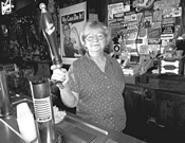"They broke all the locks in back, broke the doorknob," Hanych says, gesturing toward the rear entrance of the club, which someone unsuccessfully tried to pry open the night before. "They tried to break in where the deadbolt is and chipped all the wood away from there."
Hanych looks mildly perturbed, as if the Tribe had just lost in extra innings, but that's about it. It's hard to intimidate a lady who's been keeping watch over Cleveland's most hardscrabble club ever since she was 11, when she did the dishes while her mom cooked. Besides, Hanych knows this routine well. "One year, I think, we had seven break-ins," she says.
Yet Pat's still stands, offering a Straub and some company along one of Cleveland's loneliest stretches. The place has become Cleveland's definitive rock club, a blue-collar bar where factory hands in work boots and flannel shirts mingle with young punks who aren't welcome anywhere else. In a city whose unofficial motto is "You gotta be tough," Pat's embodies Cleveland's working-class tenacity.
Located at the bottom of Literary Hill in Tremont, Pat's sits squat and defiant in the industrial armpit of the Flats, surrounded by few signs of life. Its only neighbors are a gas refinery and a hot-mix asphalt facility. Broken beer bottles line the crumbling street, which looks as if it has just been hit by a meteor shower.
True to its surroundings, Pat's is similarly weathered. Dozens of faded album covers from local luminaries like the New Salem Witch Hunters and Knifedance line the entrance above the men's room. A constellation of heart-shaped 45s dangles from a Genesee-beer lamp above the bar. Stickers decorate the walls -- "If Idiots Could Fly, This Place Would Be An Airport," one reads -- alongside a framed photo of Hanych's old dog, Budweiser, sleeping atop the pool table. "He was a good band dog," she says with a smile as bright as her wispy blond hair. "He only peed on one band -- and they deserved it."
At the back of the room is a small stage, though bands often play on the floor. Since Pat's started hosting shows in 1988, everyone from future stars like the White Stripes to local favorites like Satan's Satellites have played there.
Granted, there are venues of greater national renown in the city, like the Beachland Ballroom, the Grog Shop, and Peabody's, which rank among the best in the country. But Pat's is Cleveland's most egalitarian venue -- anyone can book a show there. If a group is too noisy or experimental for other clubs, Hanych will take it in.
"There's no cliques, there's no stuffiness. When you go to Pat's, no one looks at you weird for what you're wearing," says Eddie Fleisher, who hosts experimental-music nights at Pat's under the name Johnny La Rock. "People of all different backgrounds and tastes come together there. It feels like a home away from home."
And unlike other clubs, bands get all the money from the door, meaning they might go home with something more than a gutful of free High Life.
"If you're a band that draws somewhat decently and you do a show there, you'll do pretty fuckin' well," says Tony Erba, bassist for Cleveland rippers Nine Shocks Terror, who will be joining a slew of other groups at Pat's this Saturday for an anniversary show.
What's made Pat's such an enduring presence all these years is that it's more evocative of this city than any other club. Like Cleveland itself, Pat's has survived erosion of the manufacturing base that once provided the area's main economic stimulus. Hanych used to open at 5:30 a.m. and cook breakfast, lunch, and dinner for workers in the area. Now most of them are gone, their plants shuttered, and she fires up the griddle only on Friday mornings.
But she's still running the place all by herself, doing all the work, with only a part-time helper on the weekends. She prides herself on being a survivor, running an underdog club in an underdog city. "Let's face it," she says with a chuckle, "when you've been down here so long, there aren't very many things that can threaten you."


